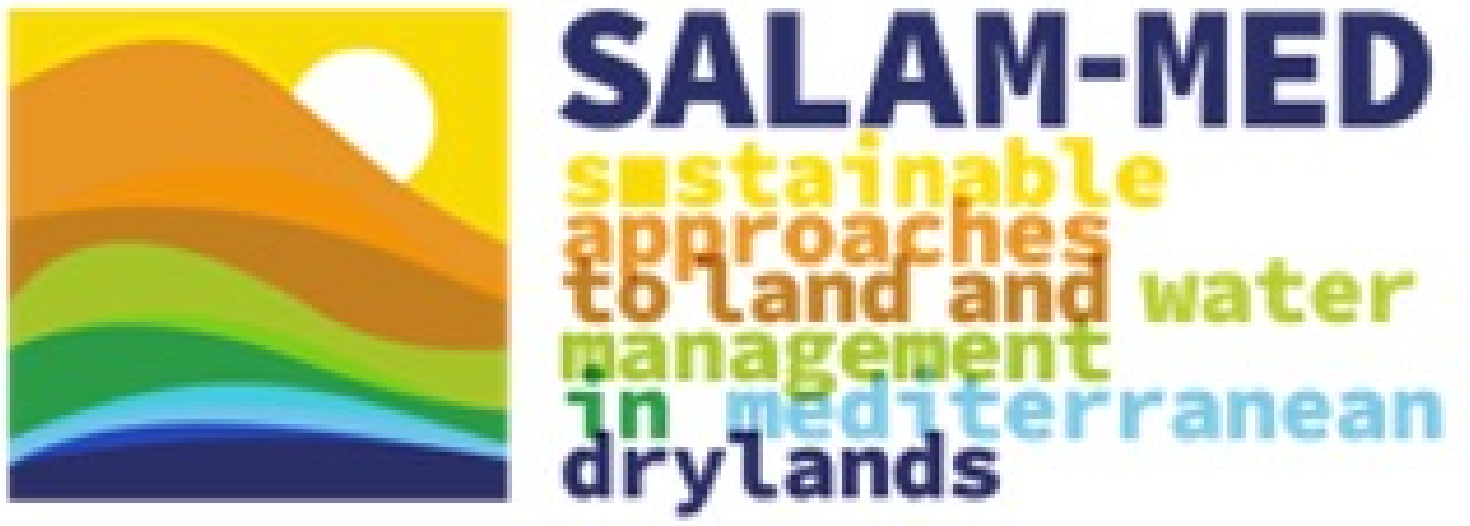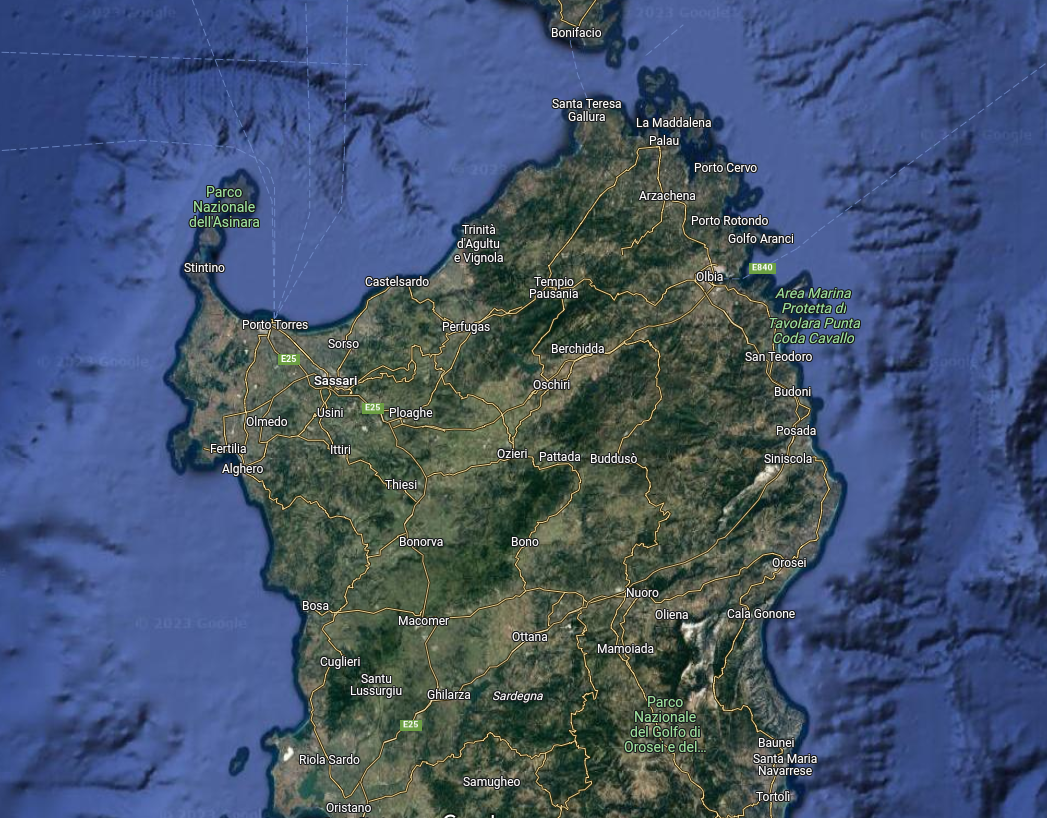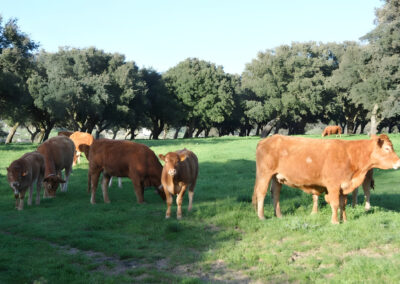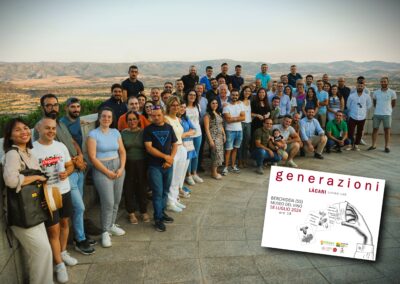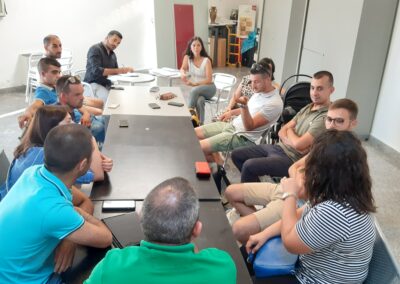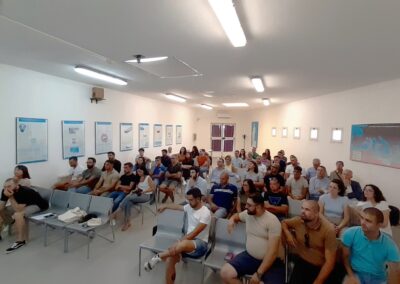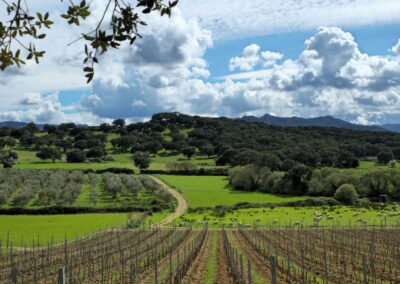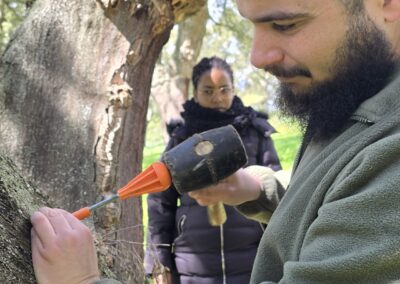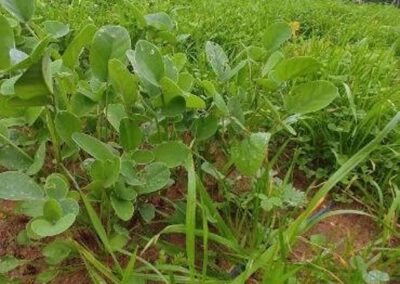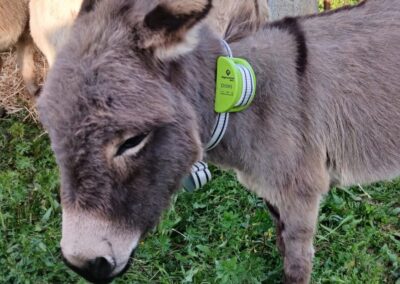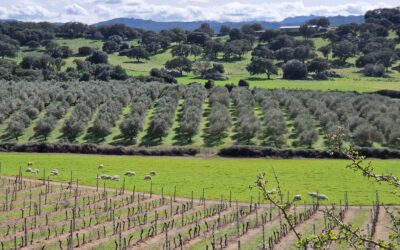Italy
Technologies and Practical solutions developed here
- DSS for forage crop improvement
- Dynamic approach to Silvopastoral Systems
- Microbial-based solutions to increase soil health and fertility
- Virtual Fencing for Adaptive Multipaddock Grazing
- Virtual Fencing to preserve ecosystem services
Leader
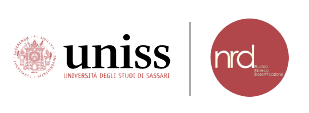
Desertification Research Centre (NRD) – UNISS
Profile
Altitude: 250-350 m a.s.l.
Coordinates: 40°49’N; 9°16’E
Size: 200 km² scalable to ≈3,000 km²
Mean annual temp: 14.2 °C
Mean annual prec.: 632 mm
Mean annual ETo: 1050 mm
Aridity index: 0.53
Local population: Gallura, 60,000
Main land uses, crops and animals: agro-
silvopastoral, vineyards, dairy sheep,
suckling cows, cork extraction
The Living Lab
The Italian Lacani Living Lab, located in Sardinia's Berchidda-Monti observatory, promotes sustainable Mediterranean agro-silvopastoral systems. It engages stakeholders—including local farmers, youth, women, and institutions—through interviews, workshops, and practical experiments to tackle ecological, economic, and climate pressures threatening traditional agricultural practices.
read more close
Through extensive stakeholder interactions, the lab identified urgent challenges such as climate change, economic volatility, land abandonment, and limited generational turnover. Stakeholders expressed strong interest in innovative, practical solutions, including microbial-based techniques to improve soil fertility, advanced grazing management tools, and new business models supporting local enterprise and youth employment. Achievements include the co-design and implementation of experiments in soil health and grazing efficiency, directly involving farmers to ensure relevance and adoption. Notably, collaborative projects like the "School for Shepherds" and dedicated youth events have fostered a dynamic innovation community and increased youth participation significantly, involving about 100 young people. Strategic agreements with local institutions and GAL networks enhanced the lab’s capacity to scale innovations and stimulate local economies. Challenges such as governance sustainability, structured data collection, and consistent stakeholder engagement are being actively addressed. Overall, the Lacani Living Lab successfully integrates scientific knowledge and local expertise, driving the resilience of silvopastoral ecosystems and creating enduring business opportunities, particularly for women and youth. The lab exemplifies an effective model of collaborative innovation, addressing both ecological restoration and socio-economic revitalization in the Mediterranean.
Last News from the Living Lab
This section aims to foster dialogue and exchange of information among key Living Lab stakeholders, continuously updating all participants on progress and news about activities carried out.
Làcani Living Lab
The next event of the Làcani Living Lab will illustrate the potential of amendments such as liming and biochar in improving soil fertility of Mediterranean rainfed grasslands.
Stakeholders
The Living Lab is based on the collaboration of different stakeholders, each of whom brings useful skills and resources to address the area’s challenges in an integrated way. Their active participation enables the development of effective and shared solutions. This section presents the main stakeholders and their contributions to the project.

Nucleo di Ricerca sulla Desertificazione - Università degli studi di Sassari
NRD is a research center of the University of Sassari that promotes multidisciplinary research on desertification. NRD’s activities are carried out within the framework of programmes funded by the EU, international agencies, the national government…

Museo del vino - Berchidda
Located in northern Sardinia, the Museo del Vino di Berchidda is a multimedia museum dedicated to the island’s winemaking heritage. It showcases traditional tools, local grape varieties, and the cultural role of wine through interactive exhibits. The museum also houses the Enoteca Regionale, offering tastings of Sardinian wines like Vermentino…
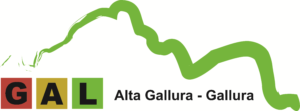
GAL Alta Gallura
GAL Alta Gallura is a Local Action Group operating in northern Sardinia, dedicated to promoting sustainable rural development through community-led strategies. It supports local enterprises, agricultural innovation, and environmental conservation by funding projects, fostering partnerships, and enhancing the social and economic…

Associazione delle Casare e dei Casari di azienda agricola
Founded in 2002, the Associazione delle Casare e dei Casari di Azienda Agricola is a non-profit organization dedicated to protecting and promoting Italy’s small-scale dairy farming sector. It serves as a national reference point for farm-based cheesemakers, offering professional…
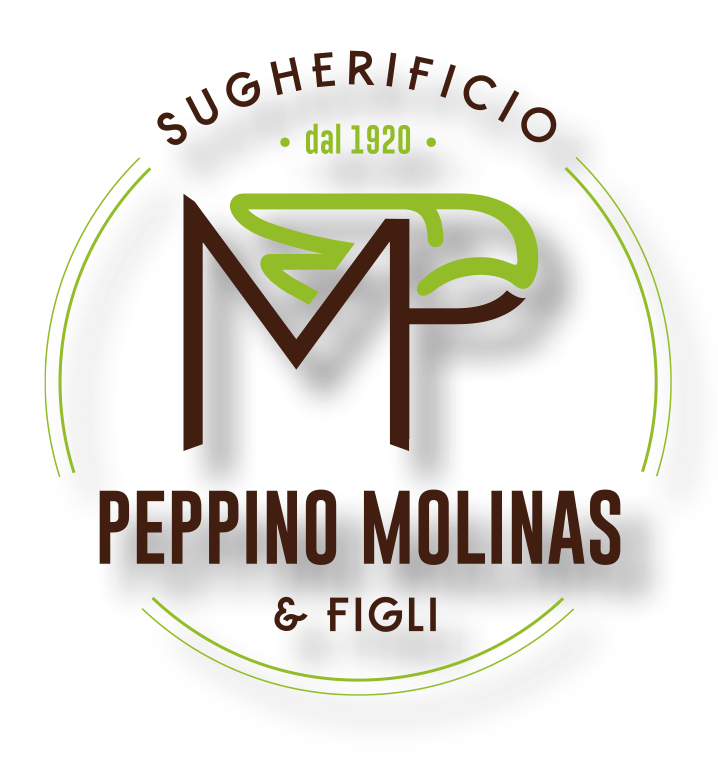
Sugherificio Molinas
Founded over a century ago in Calangianus, Sardinia, Sugherificio Molinas S.p.A. is Italy’s leading producer of cork stoppers and cork-based materials for green building. Combining traditional craftsmanship with advanced technology, the company manages a fully certified supply chain—from sustainably harvested cork oak forests to high…
Would you like to be added among the stakeholders?
Sign up and we will add you.
Technologies and Practical solutions developed in this Living Lab
Oak ecosystems are key structural components of MED silvopastoral systems. They correspond to contrasting land management practices resulting in a diversity of ground and surface water dynamics. Tree cover is a key feature of these ecosystems integrating large scale grazing, forestry and crop cultivation (Blondel, 2006). A wide range of provisioning, regulating, supporting and cultural ecosystem services are associated to these agroforestry ecosystems (Bagella et al, 2020).
Click on the cards below to learn more about the individual technologies tested in the living lab.
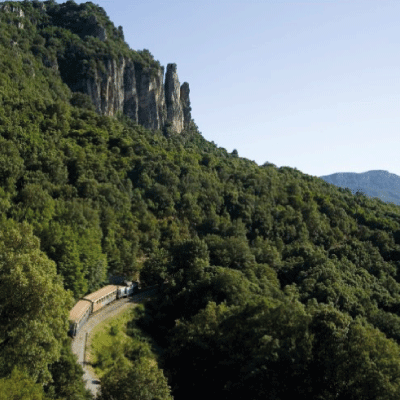
DSS for forage crop improvement
Dynamic approach to Silvopastoral Systems
Microbial-based solutions to increase soil health and fertility
Virtual Fencing for Adaptive Multipaddock Grazing
Virtual Fencing to preserve ecosystem services
Stakeholders Signup
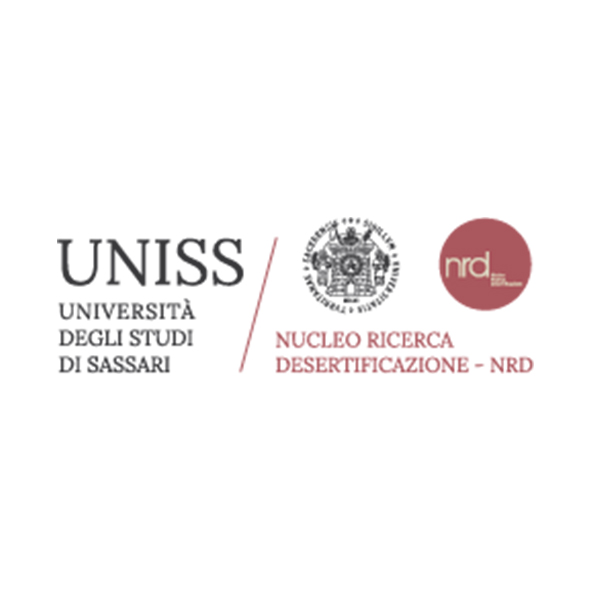
Nucleo di Ricerca sulla Desertificazione - Università degli studi di Sassari
NRD is a research center of the University of Sassari that promotes multidisciplinary research on desertification. NRD’s activities are carried out within the framework of programmes funded by the EU, international agencies, the national government and the Autonomous Region of Sardinia. NRD includes about 40 scholars and approximately twenty young researchers from various disciplines including agronomy, environmental sciences, hydrogeology, pedology, plant protection, sociology, economics, etc.
Over the years, NRD has gained increasing visibility on the international scene, assuming the role of general secretariat of DesertNet International, a think-tank of researchers involved in the fight against desertification, accredited to the UNCCD. NRD also leads the Global Network of Dryland Research Institutes (GNDRI), an association of institutions (not individual researchers) active in dryland research, which aims to promote institutional interactions to strengthen cooperation in research

Museo del vino - Berchidda
Located in northern Sardinia, the Museo del Vino di Berchidda is a multimedia museum dedicated to the island’s winemaking heritage. It showcases traditional tools, local grape varieties, and the cultural role of wine through interactive exhibits. The museum also houses the Enoteca Regionale, offering tastings of Sardinian wines like Vermentino di Gallura, and often collaborates with local events such as the Time in Jazz Festival.
The Museo del Vino di Berchidda plays a key role in the Lacani Living Lab by providing a welcoming space for participatory workshops and meetings, bringing together farmers, winemakers, policymakers, and researchers to co-design sustainable solutions for land and water management.

GAL Alta Gallura
GAL Alta Gallura is a Local Action Group operating in northern Sardinia, dedicated to promoting sustainable rural development through community-led strategies. It supports local enterprises, agricultural innovation, and environmental conservation by funding projects, fostering partnerships, and enhancing the social and economic vitality of the territory. GAL Alta Gallura plays a key role in empowering local stakeholders and strengthening connections between tradition and innovation.
GAL Alta Gallura actively supports the Lacani Living Lab by fostering local engagement and territorial development, helping to connect farmers, rural enterprises, and institutions, and facilitating collaborative initiatives focused on sustainable agriculture, innovation, and environmental stewardship.

Associazione delle Casare e dei Casari di azienda agricola
Founded in 2002, the Associazione delle Casare e dei Casari di Azienda Agricola is a non-profit organization dedicated to protecting and promoting Italy’s small-scale dairy farming sector. It serves as a national reference point for farm-based cheesemakers, offering professional training, technical support, and advocacy.The association fosters knowledge exchange and collaboration among producers, aiming to enhance the economic and social sustainability of agricultural cheesemaking.
It also represents its members at the European level through participation in networks like FACE (Farmhouse and Artisan Cheese and Dairy Producers European Network).

Sugherificio Molinas
Founded over a century ago in Calangianus, Sardinia, Sugherificio Molinas S.p.A. is Italy’s leading producer of cork stoppers and cork-based materials for green building. Combining traditional craftsmanship with advanced technology, the company manages a fully certified supply chain—from sustainably harvested cork oak forests to high-quality finished products.
With a daily production of two million cork stoppers, Molinas serves renowned wineries worldwide, ensuring quality through rigorous laboratory testing and certifications like ISO 9001 and FSC®.
